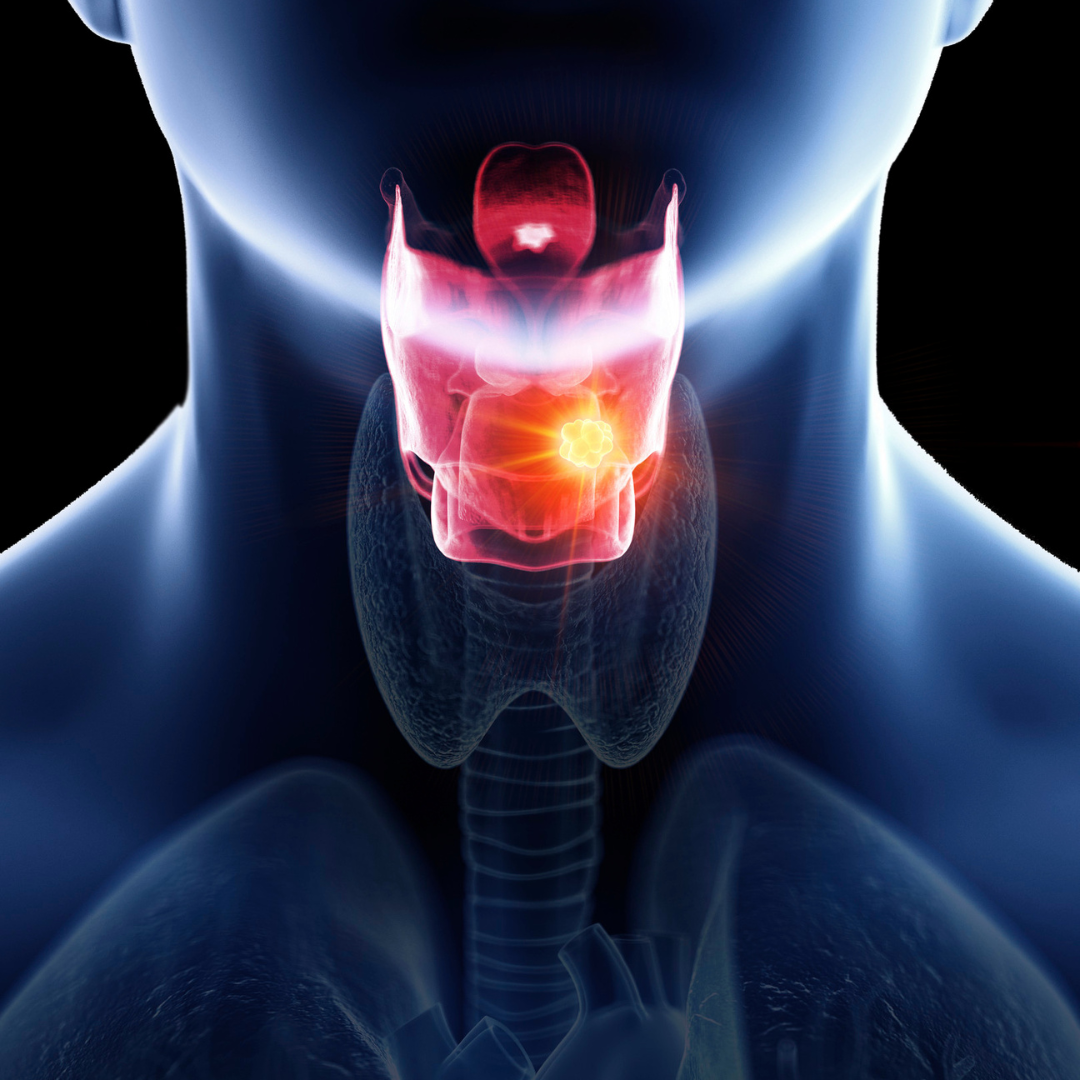Laryngitis
Content of This Page
1- Introduction
2- Causes
3- Symptoms
4- Stages of The Disease
5- Treatment
6- What Should You Avoid
Introduction
Laryngitis is characterized by inflammation of the larynx, which is the anatomical structure housing the vocal cords. This inflammation disrupts normal vocal cord function, leading to altered voice quality, such as hoarseness or aphonia.

Causes
Laryngitis is primarily caused by a range of factors that lead to inflammation of the larynx (voice box). The causes can be categorized into several types:
Infectious Agents:
- Viral Infections: The most common cause of laryngitis. Viruses such as rhinoviruses, adenoviruses, influenza viruses, and parainfluenza viruses lead to inflammation of the laryngeal mucosa.
- Bacterial Infections: Less common but can occur, especially following viral infections. Bacteria such as Streptococcus pneumoniae, Haemophilus influenzae, and Mycobacterium tuberculosis may cause bacterial laryngitis.
Irritants:
- Environmental Irritants: Chronic exposure to smoke (e.g., tobacco smoke), pollutants, and chemical fumes can irritate the laryngeal mucosa, leading to inflammation.
- Gastroesophageal Reflux Disease (GERD): Acid reflux can irritate the larynx and lead to chronic inflammation.
Mechanical Factors:
- Vocal Strain: Excessive use of the voice, such as prolonged speaking, shouting, or singing, can strain the vocal cords and lead to inflammation. This includes occupational voice strain (e.g., teachers, singers).
Allergic Reactions:
- Allergies: Allergic reactions to substances such as pollen, dust, or pet dander can cause laryngeal inflammation and swelling.
Trauma:
- Physical Injury: Trauma to the larynx, such as from intubation or external injury, can cause inflammation and irritation.
Chronic Conditions:
- Chronic Laryngitis: Persistent irritation from chronic conditions such as chronic sinusitis, chronic rhinitis, or other long-term infections can contribute to ongoing laryngeal inflammation.
Symptoms
Hoarseness: Changes in voice quality, including a raspy, strained, or breathy voice, are hallmark symptoms. In severe cases, the voice may become nearly inaudible.
Aphonia: Complete loss of voice, where the individual is unable to speak, can occur, particularly in cases of severe laryngeal inflammation.
Sore Throat: A general discomfort or pain in the throat is common, often exacerbated by speaking or swallowing.
Dry Throat: A sensation of dryness or scratchiness in the throat is frequent.
Cough: A persistent, dry cough may accompany laryngitis as the body attempts to clear the irritation from the throat.
Throat Clearing: Frequent need to clear the throat, often due to the feeling of mucus or irritation.
Swollen Glands: In some cases, the lymph nodes in the neck may become swollen or tender.
Fever: If laryngitis is caused by an infection, mild to moderate fever may be present, especially if there is an accompanying upper respiratory infection.
Difficulty Swallowing: Pain or discomfort while swallowing can occur if the inflammation extends to the surrounding tissues.
Voice Fatigue: The voice may become tired more quickly than usual, and speaking can become more strenuous.

Stages of The Disease
Acute Laryngitis:
- Onset: Typically begins suddenly, often following a viral infection such as the common cold or after excessive use of the voice.
- Duration: Usually lasts from a few days to a couple of weeks.
- Symptoms: Sudden onset of hoarseness, sore throat, dry cough, and possible fever. Symptoms may peak within the first few days and then gradually improve with proper management and rest.
Subacute Laryngitis:
- Onset: Follows acute laryngitis, particularly if the initial condition was not adequately treated or if there was ongoing exposure to irritants.
- Duration: Lasts from a few weeks to about a month.
- Symptoms: Persistent hoarseness and throat discomfort, with possible lingering cough and throat clearing. Symptoms may be less intense than in the acute phase but are more prolonged.
Chronic Laryngitis:
- Onset: Develops over a longer period due to continuous exposure to irritants, chronic infections, or ongoing vocal strain.
- Duration: Lasts for more than three to four weeks and can be persistent or recurrent.
- Symptoms: Long-term hoarseness, chronic throat irritation, persistent cough, and voice fatigue. Individuals may also experience symptoms related to underlying chronic conditions, such as GERD or chronic sinusitis.
Treatment
Acute Laryngitis
Voice Rest:
- Recommendation: Limit speaking and avoid whispering to reduce strain on the vocal cords.
Hydration:
- Recommendation: Drink plenty of fluids to keep the throat moist and facilitate mucosal healing. Warm beverages like herbal teas can be soothing.
Humidification:
- Recommendation: Use a humidifier or vaporizer to add moisture to the air, which helps reduce throat dryness and irritation.
Avoid Irritants:
- Recommendation: Steer clear of smoking and exposure to environmental irritants like chemicals and dust.
Over-the-Counter Remedies:
- Recommendation: Use throat lozenges or sprays that contain soothing agents like honey or menthol. Non-prescription pain relievers (e.g., acetaminophen or ibuprofen) can help alleviate pain.
Rest and Self-Care:
- Recommendation: Get adequate rest to support the immune system and promote recovery.
Subacute Laryngitis
Continued Voice Rest:
- Recommendation: Maintain voice rest as much as possible to prevent aggravation of symptoms.
Ongoing Hydration and Humidification:
- Recommendation: Continue to stay hydrated and use a humidifier to keep the throat moist.
Address Underlying Causes:
- Recommendation: Identify and manage any persistent irritants or conditions contributing to the laryngitis (e.g., GERD).
Medical Evaluation:
- Recommendation: If symptoms persist, a healthcare professional may evaluate for possible chronic conditions or complications.
Chronic Laryngitis
Comprehensive Treatment of Underlying Conditions:
- Recommendation: Manage chronic conditions that contribute to laryngitis, such as GERD, allergies, or chronic sinusitis. This may include medications or lifestyle modifications.
Voice Therapy:
- Recommendation: Consider speech therapy with a specialist to address voice misuse or strain and to learn techniques for vocal cord protection.
Medical Interventions:
- Recommendation: In cases where chronic irritation has led to vocal cord nodules or polyps, a healthcare professional may recommend surgical or medical treatments.
Avoidance of Long-Term Irritants:
- Recommendation: Long-term avoidance of irritants like tobacco smoke and excessive vocal strain is crucial for ongoing management.
Pharmacological Treatment:
- Recommendation: Use prescription medications as directed for managing symptoms or underlying conditions, such as corticosteroids for severe inflammation.
What Should You Avoid
1. Overuse of the Voice:
- Recommendation: Avoid excessive speaking, yelling, or whispering, as these can strain the vocal cords and prolong recovery.
2. Irritants:
- Smoking: Avoid tobacco smoke, including secondhand smoke, as it irritates the laryngeal mucosa and impairs healing.
- Environmental Pollutants: Minimize exposure to air pollution, dust, and chemical fumes, which can aggravate inflammation.
3. Dry Environments:
- Recommendation: Avoid environments with low humidity, as dry air can exacerbate throat irritation. Use a humidifier to maintain adequate moisture levels in the air.
4. Alcohol and Caffeine:
- Recommendation: Limit consumption of alcohol and caffeinated beverages, as they can dehydrate the body and worsen throat dryness.
5. Spicy or Acidic Foods:
- Recommendation: Avoid spicy, acidic, or hot foods and beverages, especially if they contribute to throat irritation or exacerbate symptoms of gastroesophageal reflux disease (GERD).
6. Gastroesophageal Reflux Disease (GERD) Triggers:
- Recommendation: If GERD is a factor, avoid foods and drinks that trigger acid reflux, such as fatty foods, chocolate, and citrus fruits.
7. Throat Clearing:
- Recommendation: Avoid frequently clearing your throat, as this can further irritate the vocal cords and prolong symptoms.
8. Exposure to Allergens:
- Recommendation: Reduce exposure to known allergens, such as pollen, dust, or pet dander, which can aggravate throat inflammation.
9. Dehydration:
- Recommendation: Avoid dehydration by drinking plenty of fluids. Dehydration can worsen throat dryness and discomfort.
10. Excessive Use of Decongestants:
- Recommendation: Use decongestants sparingly, as they can dry out mucous membranes and potentially worsen throat irritation.